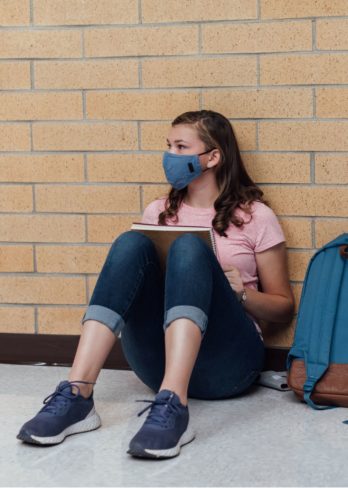

Back-To-School Anxiety: COVID-19
While back-to-school is typically a time of excitement, it’s normal for kids to experience some degree of anxiety as a new school year approaches. Younger children may get nervous about leaving their parents, and older children may worry about academics or how they’ll fit in with their friends after spending time apart during summer.
This year, COVID-19 may add to those stresses as children worry about themselves or their loved ones becoming ill. In addition, many normal routines will change as schools take precautions to prevent the spread of COVID-19. The uncertainty of the situation and changes in routine can cause many students and parents to feel stressed and anxious.
What are the signs your child is feeling anxious about school?
Children may show their anxiety in different ways. You know your child best, so be on the lookout for changes in your child’s behavior and mood, such as:
- Increased defiance or irritability
- Disturbances in sleep
- Loss of appetite
- Lack of concentration
- Less energy
- Physical symptoms like nausea, muscle tension or dizziness
- Refusal to go to school
- Sadness or crying
If your child is showing any of these signs, they may have anxiety about returning to school or COVID-19 in general.
How to support your child’s mental health during COVID-19
If your child is experiencing anxiety related to COVID-19, it’s important to discuss their feelings and have open and honest conversations. How you help your child as they transition back to school may depend on what type of anxiety they are experiencing and their age.
- Check-in with your child frequently and listen to their concerns. Make sure to validate their emotions, letting them know that their concerns and frustrations are understandable.
- Help your child focus on what they can control in the fight against the pandemic, such as hand washing, wearing a face mask, and practicing social distancing.
- Ensure your child is getting enough sleep, being physically active, and eating healthy food to support a healthy body and mind.
- Encourage your child to do more of what they enjoy most, whether reading, playing outside, or other activities.
- While plans may continue to change, explain to your child what you do know about what the school year or classroom will look like to help them mentally prepare.
- If your child is going to participate in virtual or remote learning, take steps to set them up for success academically, physically, and emotionally. See tips to support virtual learning.
- Whether your child will be returning to school in person or virtually, it is important to ease them back into a structured daily routine and sleep schedule.
- If possible, visit your child’s school ahead of the first day of classes or allow your child to meet their teacher in a social distancing situation.
- Help your child adjust to COVID-19 precautions such as wearing a face mask by practicing at home. It is okay to empathize with your child if they find wearing a mask uncomfortable. Let them know that although it can be unpleasant at times, wearing a mask is an important way we can help protect others. See more tips to help children adjust to wearing a mask.
- For older children, remind them that they are helping protect others and doing good for their community by following health precautions.
- Set up ways for your child to continue to socialize safely with their friends over the phone or video chat, especially if they participate in distance learning.
- Teach your child breathing exercises they can do when they feel anxious.
- Send positive or encouraging notes in your child’s lunch or backpack.
Source: https://www.childrens.com/health-wellness/back-to-school-anxiety-during-covid-19
